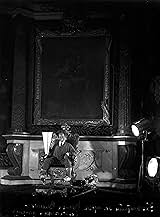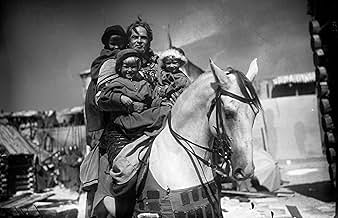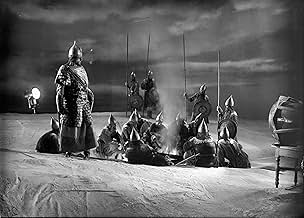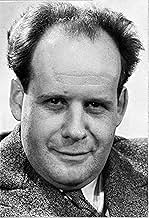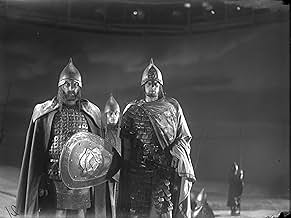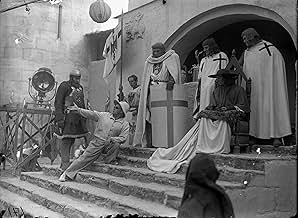IMDb रेटिंग
7.5/10
13 हज़ार
आपकी रेटिंग
अपनी भाषा में प्लॉट जोड़ेंThe story of how a great Russian prince led a ragtag army to battle an invading force of Teutonic Knights.The story of how a great Russian prince led a ragtag army to battle an invading force of Teutonic Knights.The story of how a great Russian prince led a ragtag army to battle an invading force of Teutonic Knights.
- निर्देशक
- लेखक
- स्टार
- पुरस्कार
- कुल 2 जीत
Nikolay Cherkasov
- Aleksandr Nevsky
- (as N. Cherkasov)
Nikolai Okhlopkov
- Vasili Buslai
- (as N. Okhlopkov)
Andrei Abrikosov
- Gavrilo Oleksich
- (as A. Abrikosov)
Dmitriy Orlov
- Ignat - the Master Armorer
- (as D. Orlov)
Vasili Novikov
- Pavsha - Governor of Pskov
- (as V. Novikov)
Nikolai Arsky
- Domash Tverdislavich - a Novgorod Boyar
- (as N. Arsky)
Varvara Massalitinova
- Amelfa Timoferevna - Buslai's Mother
- (as V. Massalitova)
Valentina Ivashova
- Olga Danilovna - a Maid of Novgorod
- (as V. Ivashova)
Aleksandra Danilova
- Vasilisa - a Maid of Pskov
- (as A. Danilova)
Sergei Blinnikov
- Tverdilo - Traitorous Mayor of Pskov
- (as S. Blinnikov)
Ivan Lagutin
- Anani - a Monk
- (as I. Lagutin)
Lev Fenin
- The Archbishop
- (as L. Fenin)
Naum Rogozhin
- The Black-Hooded Monk
- (as N. Rogozhin)
Nikolai Aparin
- Mikhalka
- (बिना क्रेडिट के)
Boris Belyakov
- Rytsar
- (बिना क्रेडिट के)
A. Gulkovski
- Teutonic Knight
- (बिना क्रेडिट के)
Avenir Gulkovskiy
- rytsar Tevtonskogo ordena
- (बिना क्रेडिट के)
फ़ीचर्ड समीक्षाएं
10ekeby
I've loved this movie since the first time I saw it lo these many years ago. I'm not sure how many times I've seen it, perhaps 10, perhaps 20. This last time I watched it I was struck by a detail that I hadn't noticed before.
Toward the end of the picture, the slain heroes are conveyed back to the town via sled. There are a couple of closeups of the dead men. The one that struck me most was a shot of the blond youth. All you see on the screen is his profile from head to hands. His hands hold a flickering candle. The wind is blowing and his thick blond hair is dancing in the wind, in sync with the flicker of the candle flame. The contrast between death and the life he has lost is incredibly powerful. The moving hair and candle flame remind us of the life force that once inhabited his body.
Every time I revisit this film I see something new.
Toward the end of the picture, the slain heroes are conveyed back to the town via sled. There are a couple of closeups of the dead men. The one that struck me most was a shot of the blond youth. All you see on the screen is his profile from head to hands. His hands hold a flickering candle. The wind is blowing and his thick blond hair is dancing in the wind, in sync with the flicker of the candle flame. The contrast between death and the life he has lost is incredibly powerful. The moving hair and candle flame remind us of the life force that once inhabited his body.
Every time I revisit this film I see something new.
Eisenstein's "Alexander Nevsky" was made mostly for propaganda purposes in 1938. It was a reminder to all Russians of their dastardly neighbors (the Nazis) to their west. The film plays on this comparison and several others to a lesser degree. The evil Germanic Teutonic Knights just happen to be of the Christian faith and their religious leaders make for very effective villians. Although Nikolai Cherkasov as Nevsky and Nikolai Okhlopkov as his right-hand man, Vasili, are commanding in their roles, this movie is mainly noted for the final climactic battle between good (the Russians) and pure evil (the Germans). Eisenstein purposely covers the Germans with over-sized helmets so that they're totally devoid of any human facial expressions. On the contrary, the Russian peasants who comprise most of Nevsky's army are portrayed with a variety of emotions and their humanity is not only recognizable but refreshing and appealing to the viewer. When the Teutonic Knights make their charge on the Russian position, the action is fast and furious and it would be difficult to find any other film which stages its action scenes as well as Eisenstein does here. Although a bit dated in the print that I saw (the sound was certainly a bit off) this movie is a must-see for anyone interested in foreign films and especially the Russian cinema during the days of Stalin. The Germans might have thought twice about attacking Russia in 1941 if they had seen this film beforehand. The message was clear back then. In the words of Alexander Nevsky himself: "Do not enter Russia with a sword in your hand." Well, you can't say they weren't warned.
Like many of Eisenstein's other works, "Aleksandr Nevsky" is a beautifully made and well-written propaganda piece. Even today, it stands on its own with a solid story and incredible action scenes. No one did an epic battle better than Eisenstein ("October" and "Ivan the Terrible"), and the giant battle on the frozen lake in "Nevsky" ranks up there as one of his best.
Just as important to the film as Eisenstein's script and visuals is the masterful score by Prokofiev. Fortunately, it has been rerecorded for the most recent video release and the new soundtrack adds incalcuable depth and power to the story on the screen. In my opinion, the film's score is simply the best ever composed for a film. It fits the film perfectly, both during the film's intense action scenes and the lingering moments of reflection. If for no other reason, one should see this film to hear one of the 20th century's greatest composer's best works.
The story is true (well, as true as events from the 1200s can be accurately recreated) and simple, but powerful. Despite its heavy-handed Russian/Soviet patriotism, the film succeeds in telling a compelling story. When one looks at the events unfolding when the film was made, it becomes even more of a masterpiece.
No, "Nevsky" doesn't have the flashy visuals or super-handsome stars of a modern war epic, but it still ranks of one of the most interesting films in my book. For fans of Eisenstein or classic cinema, it is an absolute must-see. And for people who want to see the Soviet propaganda machine firing on all cylinders, check it out as well.
Just as important to the film as Eisenstein's script and visuals is the masterful score by Prokofiev. Fortunately, it has been rerecorded for the most recent video release and the new soundtrack adds incalcuable depth and power to the story on the screen. In my opinion, the film's score is simply the best ever composed for a film. It fits the film perfectly, both during the film's intense action scenes and the lingering moments of reflection. If for no other reason, one should see this film to hear one of the 20th century's greatest composer's best works.
The story is true (well, as true as events from the 1200s can be accurately recreated) and simple, but powerful. Despite its heavy-handed Russian/Soviet patriotism, the film succeeds in telling a compelling story. When one looks at the events unfolding when the film was made, it becomes even more of a masterpiece.
No, "Nevsky" doesn't have the flashy visuals or super-handsome stars of a modern war epic, but it still ranks of one of the most interesting films in my book. For fans of Eisenstein or classic cinema, it is an absolute must-see. And for people who want to see the Soviet propaganda machine firing on all cylinders, check it out as well.
Guys, before saying that Alexander Nevsky is a propaganda film, please keep in mind that it is about a Russian saint, prince and patriot and it was produced in the country which totally denied religion, patriotism and nobility. If you look more attentively you can notice that the Novgorod churches had no crosses on top. The full helmets Eisenshtein took from ancient manuscripts and followed the history precisely. The portable organ the monk plays was an exact copy of the real thing from the 13th century which crusaders used. The children auto-da-fe was taken from ancient chronicles (both Russian and German). But in addition it had religious meaning since it draws parallel with Herod's slaughter of the innocents (used later once again in Ivan The Terrible). Alexander Nevsky is a Russian historical saga which has everything in common with old Russian cultural and historical tradition but nothing (or very little) with the Soviet propaganda. The film definitely has allusions to the Stalin's time: free Novgorod republic fights for its freedom at the expense of prosperity, elected prince Alexander (leader but not czar) etc. But nevertheless I think that the French critic Robert Brasillach (he was very close to nazis) was right when he called Alexander Nevsky the slavic war carol which has nothing to do with bolshevism, communism etc.
But IMHO Serghey Eisenshtein was against the war and followed the tradition of War And Peace by Leo Tolstoy. The same plot with common people uniting to oppose the uppish professional army. If you remember the scene when Russian soldiers alike in color with the earth and trees butted into the German close formation they use axes the same way they did when chopping woods. No pride, honor or awards but every day job. I think it is an excellent film which is larger then our judgements.
But IMHO Serghey Eisenshtein was against the war and followed the tradition of War And Peace by Leo Tolstoy. The same plot with common people uniting to oppose the uppish professional army. If you remember the scene when Russian soldiers alike in color with the earth and trees butted into the German close formation they use axes the same way they did when chopping woods. No pride, honor or awards but every day job. I think it is an excellent film which is larger then our judgements.
In 1242, Russia in being invaded by two sides: from the orient by the Mongols and from Europe side, by the Germans Teutonic Knights of the Holy Roman Empire. The city of Novgorod is the last free city in Russia. The population, in order to organize the defense of Novgorod and the lands of Russia, calls the Prince Aleksandr Nevsky, who had defeated the Swedish in a previous battle. His successful strategy defeats the Germans, after a great battle on a frozen lake. This movie was made in 1938 due to the threaten of the German to Russia, in a pre-Second World War period. The idea was to make propaganda pro-Russia. However, it is an overwhelming, marvelous, stunning powerful masterpiece. It is amazing the combat scene on the frozen lake. The present generation is very accustomed to special effects, like in the `Lord of the Rings' trilogy, and maybe cannot understand how fantastic is this black and white fight. If the viewer can forget the ideology and watch it as an art, he will certainly be astonished in the end with such a masterpiece. My vote is ten.
Title (Brazil): Alexander Nevsky
Title (Brazil): Alexander Nevsky
क्या आपको पता है
- ट्रिवियाJoseph Stalin wanted this film to be a propaganda tool to warn Soviet citizens to be wary of German aggression. However, it was rejected at first due to it being "too anti-German", as it came out shortly before the Soviet-German non-aggression pact of 1939 was signed. In 1941, the peace was broken and Stalin reportedly demanded that it be shown in every Soviet movie theater as a rallying cry against the invasion.
- गूफ़Gavrila Alexich, one of the movie's main protagonists, could not participate in the Battle of Ice. He was killed one year before it, in 1241, storming the fortress of Koporye.
- भाव
Alexandr Nevsky: Go tell all in foreign lands that Russia lives! Those who come to us in peace will be welcome as a guest. But those who come to us sword in hand will die by the sword! On that Russia stands and forever will we stand!
- क्रेज़ी क्रेडिटBefore the word "End" appears Alexandr Nevsky's famous quote "But those who come to us sword in hand will die by the sword! On that Russia stands and forever will we stand!" appears on the screen, right after Nevsky said it in the movie.
- इसके अलावा अन्य वर्जनA new edition appeared on video in 1995 with the entire Prokofiev score newly recorded in hi-fi stereo, using the same 1938 orchestrations and perfectly synchronized to the original 1938 dialogue and sound effects tracks, so that it is now possible to see and hear the film exactly as it always was, with the exception being that the music is now heard in hi-fi sound, rather than the tinny 1938 recording.
टॉप पसंद
रेटिंग देने के लिए साइन-इन करें और वैयक्तिकृत सुझावों के लिए वॉचलिस्ट करें
- How long is Alexander Nevsky?Alexa द्वारा संचालित
विवरण
बॉक्स ऑफ़िस
- दुनिया भर में सकल
- $2,226
- चलने की अवधि1 घंटा 52 मिनट
- रंग
- ध्वनि मिश्रण
- पक्ष अनुपात
- 1.37 : 1
इस पेज में योगदान दें
किसी बदलाव का सुझाव दें या अनुपलब्ध कॉन्टेंट जोड़ें


